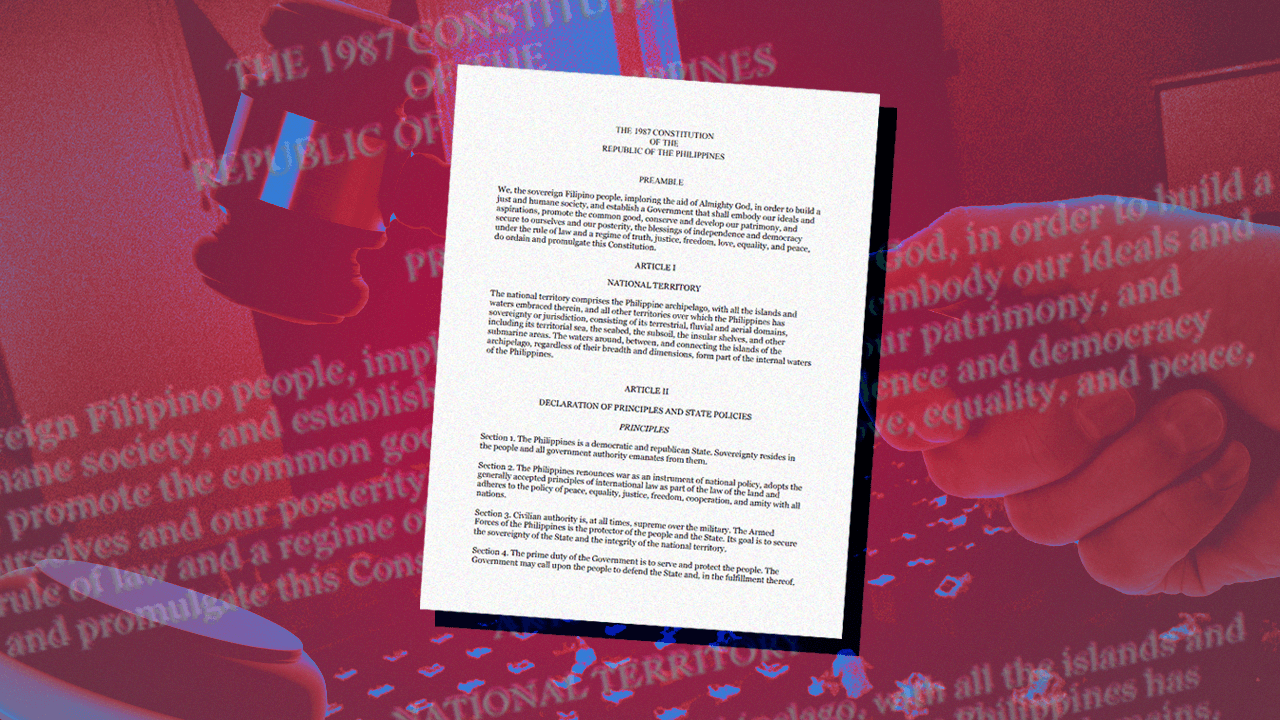SUMMARY
This is AI generated summarization, which may have errors. For context, always refer to the full article.

MANILA, Philippines – The push to amend or revise the 1987 Constitution is rapidly gaining traction in the House of Representatives under the Marcos administration.
That’s even though President Ferdinand Marcos Jr. has said that charter change (Cha-Cha), is not a priority.
As of February 27, the main proposal in the lower chamber is an unnumbered accompanying bill to Resolution of Both Houses No. 06, which calls for charter change.
Here are the key provisions.
Method for Cha-Cha
There are a number of methods to amend or revise the Constitution:
- a people’s initiative wherein at least 12% of the total number of registered voters, of which every legislative district is represented by at least 3% of voters, sign a petition
- a constituent assembly where Congress, upon a vote of three-fourths of its members, propose amendments or revisions
- a constitutional convention, where delegates – elected and appointed – meet to propose amendments or revisions
The current proposal pushes for a constitutional convention route.
Composition
The constitutional convention will be composed of around 300 members, 20% of whom will be sectoral representatives.
There will be one delegate per legislative district, to be elected by the voting public. The House speaker and the Senate president, meanwhile, will jointly appoint the sectoral representatives.
The delegates shall include:
- three retired members of the judiciary
- three members of the academe
- three representatives from the legal profession
- two economists
- two representatives from the medical profession
- two representatives from the science and technology profession
- two representatives from the business sector
- two representatives from the labor sector
- two representatives from the urban poor
- two representatives from the farmers and fisherfolk sector
- two representatives from indigenous cultural communities
- two representatives from the women sector
- two representatives from the youth sector
- two veterans
- two representatives from the senior citizens and persons with disabilities sector
Qualifications of delegates
A delegate must be:
- a natural citizen of the Philippines
- at least 25 years old on the day of election or appointment
- a college degree holder
- a registered voter in the district where he or she shall be elected
- a resident of the district where he or she shall be elected for at least one year immediately preceding election day
Officers and members of all political formations are prohibited from nominating, fielding, endorsing, supporting, and campaigning for or against any candidate.
A delegate shall not represent a political party or group, and they are prohibited from running for office in the first elections to be held after the ratification of the proposed amendments.
Salary
Each delegate is entitled to a pay of P10,000 for every day of actual attendance, excluding travel and accommodation allowance. Terms will last seven months and 13 days.
House constitutional amendments committee chairman Rufus Rodriguez previously said that the constitutional convention will need a total of P5 billion for its operations.

Key dates
The bill sets the dates that lead to the submission of the convention report on the proposed amendments.
Under the proposal, delegates will be elected on October 30, 2023, simultaneous with the barangay and Sangguniang Kabataan elections. The conduct of this electoral exercise will cost P1.5 billion, Rodriguez previously said.
The delegates will convene as a constitutional convention on November 20, 2023 at 10 am. Their job will end on June 30, 2024.
The convention will have to submit its convention report to the President, Congress, and the Commission on Elections (Comelec) on or before July 30, 2024.
The amendments will be ratified through a plebiscite to be held 60 to 90 days after the convention report is submitted.
The plebiscite would cost around P3 billion, according to Rodriguez.
Where we are
As of February 27, the House is deliberating on plenary the resolution that calls for charter change.
The unnumbered bill, meanwhile, already hurdled the constitutional amendments committee, but it will still have to be deliberated on by the appropriations committee.
Follow Rappler’s coverage of the charter change push in the 19th Congress:
- Padilla 1st non-lawyer to head Senate charter change panel since 1986
- House constitutional amendments panel chair revives Cha-Cha talks
- Not just term extension: A closer look at House bills on charter change
- Where economists, analysts invited by the House stand on charter change bills
- EXPLAINER: Is time ripe for economic charter change given the country’s woes?
- Term limits issue sparks debate during House charter change hearing
- Marcos: Charter change ‘not a priority’
- House to continue charter change talks even as Marcos says it’s not a priority
- Ex-chief justice warns ‘proxies’ of dynasties may comprise traditional con-con
– Rappler.com
Add a comment
How does this make you feel?



![[Vantage Point] Philippine economic reforms run into headwinds](https://www.rappler.com/tachyon/2024/05/ph-economic-headwind-may-2024.jpg?resize=257%2C257&crop_strategy=attention)
![[In This Economy] A counter-rejoinder in the economic charter change debate](https://www.rappler.com/tachyon/2024/04/TL-counter-rejoinder-apr-20-2024.jpg?resize=257%2C257&crop=267px%2C0px%2C720px%2C720px)
![[Just Saying] SONA, Congress, accountability, and free speech](https://www.rappler.com/tachyon/2024/07/TL-SONA-congress-accountability-free-speech.jpg?resize=257%2C257&crop=330px%2C0px%2C1080px%2C1080px)
![[Just Saying] Reciting a hymn and pledge: Illegal, punitive, unconstitutional](https://www.rappler.com/tachyon/2024/06/20240612-reciting-hymn-pledge-unconstitutional.jpg?resize=257%2C257&crop=338px%2C0px%2C720px%2C720px)
![[Just Saying] Demonizing divorce and the mockery of our Constitution](https://www.rappler.com/tachyon/2024/06/TL-Demonizing-divorce-mocking-constitution-June-6-2024.jpg?resize=257%2C257&crop=265px%2C0px%2C720px%2C720px)
![[ANALYSIS] A Rube Goldberg cartoon of our inconvenient reality](https://www.rappler.com/tachyon/2024/05/tl-inconvenient-reality-05092024.jpg?resize=257%2C257&crop=280px%2C0px%2C720px%2C720px)
There are no comments yet. Add your comment to start the conversation.